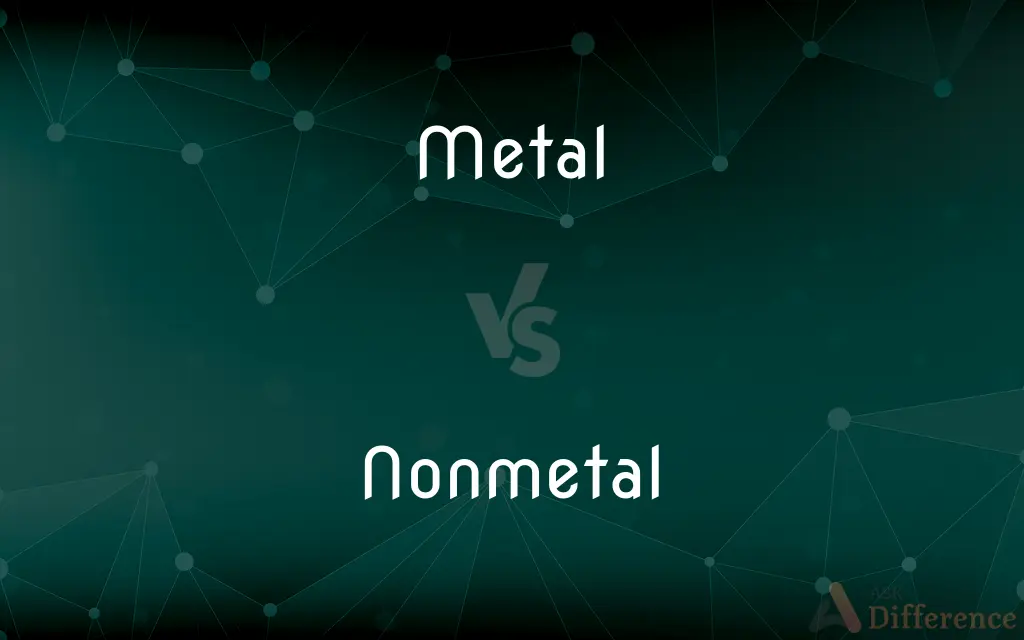Metal vs. Nonmetal — What's the Difference?
By Urooj Arif & Fiza Rafique — Updated on May 8, 2024
Metal elements are typically shiny, malleable, and good conductors of electricity, while nonmetals are generally dull, brittle, and poor conductors.

Difference Between Metal and Nonmetal
Table of Contents
ADVERTISEMENT
Key Differences
Metals are elements that are usually shiny and lustrous, indicative of their ability to reflect light. Nonmetals, on the other hand, lack this luster and often appear dull or colorless. This contrast in physical appearance is one of the basic ways to distinguish between these two categories of elements.
Metals are known for their malleability, meaning they can be hammered or rolled into thin sheets without breaking. Nonmetals, whereas, are mostly brittle and cannot be shaped in the same way without breaking or crumbling, which limits their use in applications requiring structural flexibility.
Metals are excellent conductors of heat and electricity, making them ideal for use in electrical wiring and cookware. Nonmetals are poor conductors and are therefore often used as insulators in electrical and thermal applications to prevent unwanted transfer of heat or electricity.
Many metals react by losing electrons, thereby forming positive ions. Nonmetals, on the other hand, typically gain electrons during chemical reactions, forming negative ions or covalent compounds by sharing electrons.
Metals tend to have high melting and boiling points, which is why they are often found in a solid state at room temperature. Nonmetals display a wider range of melting and boiling points, and some, like chlorine and nitrogen, are gases under standard conditions.
ADVERTISEMENT
Comparison Chart
Appearance
Shiny and reflective
Dull and non-reflective
Malleability
Malleable
Brittle
Conductivity
Good conductors
Poor conductors
Chemical Reaction
Tend to lose electrons
Tend to gain electrons
State at Room Temperature
Mostly solid
Solid, liquid, or gas
Compare with Definitions
Metal
A class of elements characterized by high conductivity and malleability.
Copper wires are used in electrical circuits because of their metallic properties.
Nonmetal
Usually have lower density compared to metals.
Carbon, in the form of graphite, is less dense than most metals.
Metal
Most metals are solid at room temperature.
Iron is used in construction because it is a durable solid metal.
Nonmetal
Often forms anions or covalent bonds in reactions.
Chlorine gains an electron to form Cl- in reactions.
Metal
Metals can be drawn into wires, a property known as ductility.
Gold is often drawn into thin wires for use in jewelry making.
Nonmetal
Nonmetals can be gases, liquids, or brittle solids at room temperature.
Bromine is a nonmetal and is liquid at room temperature.
Metal
Metals are generally shiny and reflect light.
Polished silver metal shines brightly due to its high reflectivity.
Nonmetal
Nonmetals do not exhibit malleability or ductility.
Iodine crystals easily shatter, highlighting their brittleness.
Metal
Metals tend to form cations by losing electrons.
In solutions, sodium metal forms Na+ ions.
Nonmetal
Elements that lack metallic properties and are poor conductors.
Sulfur is used in matches due to its nonmetallic nature.
Metal
A metal (from Greek μέταλλον métallon, "mine, quarry, metal") is a material that, when freshly prepared, polished, or fractured, shows a lustrous appearance, and conducts electricity and heat relatively well. Metals are typically malleable (they can be hammered into thin sheets) or ductile (can be drawn into wires).
Nonmetal
In chemistry, a nonmetal is an element that usually gains electrons when reacting with a metal, and which forms an acid if combined with oxygen and hydrogen. Nonmetals display more variety in color and state than do metals.
Metal
A solid material which is typically hard, shiny, malleable, fusible, and ductile, with good electrical and thermal conductivity (e.g. iron, gold, silver, and aluminium, and alloys such as steel)
Being a metal, aluminium readily conducts heat
An adjustable pole made of metal
Nonmetal
Any of a number of elements, such as oxygen or sulfur, that lack the physical and chemical properties of metals.
Metal
Broken stone for use in making roads
The work also involves dealing with rock aggregates for potential use as suitable road metal
Nonmetal
(chemistry) An element, such as phosphorus or chlorine, that does not have the chemical or physical properties of a metal.
Metal
Molten glass before it is blown or cast.
Nonmetal
Any one of the set of elements which, as contrasted with the metals, possess, produce, or receive, acid rather than basic properties; a metalloid; as, oxygen, sulphur, and chlorine are nonmetals.
Metal
Heavy metal or similar rock music
Crunching power-trio metal
Industrial music is also a blend of metal and techno
Nonmetal
A chemical element lacking typical metallic properties
Metal
Made from or coated with metal
A range of metalled key rings
Nonmetal
Not containing or resembling or characteristic of a metal;
Nonmetallic elements
Metal
Make or mend (a road) with road metal
The road was metalled and tolls charged for the upkeep
Follow the metalled road for about 200 yards
Metal
Any of a category of electropositive elements that usually have a shiny surface, are generally good conductors of heat and electricity, and can be melted or fused, hammered into thin sheets, or drawn into wires. Typical metals form salts with nonmetals, basic oxides with oxygen, and alloys with one another.
Metal
An alloy of two or more metallic elements.
Metal
An object made of metal.
Metal
Basic character; mettle.
Metal
Broken stones used for road surfaces or railroad beds.
Metal
Molten glass, especially when used in glassmaking.
Metal
Molten cast iron.
Metal
(Printing) Type made of metal.
Metal
(Music) Heavy metal.
Metal
To cover or surface (a roadbed, for example) with broken stones.
Metal
(heading) Chemical elements or alloys, and the mines where their ores come from.
Metal
Any of a number of chemical elements in the periodic table that form a metallic bond with other metal atoms; generally shiny, somewhat malleable and hard, often a conductor of heat and electricity.
Metal
Any material with similar physical properties, such as an alloy.
Metal
(astronomy) An element which was not directly created after the Big Bang but instead formed through nuclear reactions; any element other than hydrogen and helium.
Metal
Crushed rock, stones etc. used to make a road.
Metal
(mining) The ore from which a metal is derived.
Metal
(obsolete) A mine from which ores are taken.
Metal
(tincture) A light tincture used in a coat of arms, specifically argent (white or silver) and or (gold).
Metal
Molten glass that is to be blown or moulded to form objects.
Metal
(music) A category of rock music encompassing a number of genres (including thrash metal, death metal, heavy metal, etc.) characterized by strong drum-beats and distorted guitars.
Metal
The substance that constitutes something or someone; matter; hence, character or temper.
Metal
The effective power or calibre of guns carried by a vessel of war.
Metal
The rails of a railway.
Metal
The actual airline operating a flight, rather than any of the codeshare operators.
We have American Airlines tickets, but it's on British Airways metal.
Metal
(music) Characterized by strong drum-beats and distorted guitars.
Metal
Having the emotional or social characteristics associated with metal music; brash, bold, frank, unyielding, etc.
Metal
To make a road using crushed rock, stones etc.
Metal
An elementary substance, as sodium, calcium, or copper, whose oxide or hydroxide has basic rather than acid properties, as contrasted with the nonmetals, or metalloids. No sharp line can be drawn between the metals and nonmetals, and certain elements partake of both acid and basic qualities, as chromium, manganese, bismuth, etc.
Metal
Ore from which a metal is derived; - so called by miners.
Metal
A mine from which ores are taken.
Slaves . . . and persons condemned to metals.
Metal
The substance of which anything is made; material; hence, constitutional disposition; character; temper.
Not till God make men of some other metal than earth.
Metal
Courage; spirit; mettle. See Mettle.
Metal
The broken stone used in macadamizing roads and ballasting railroads.
Metal
The effective power or caliber of guns carried by a vessel of war.
Metal
Glass in a state of fusion.
Metal
The rails of a railroad.
Metal
To cover with metal; as, to metal a ship's bottom; to metal a road.
Metal
Any of several chemical elements that are usually shiny solids that conduct heat or electricity and can be formed into sheets etc.
Metal
A mixture containing two or more metallic elements or metallic and nonmetallic elements usually fused together or dissolving into each other when molten;
Brass is an alloy of zinc and copper
Metal
Cover with metal
Metal
Containing or made of or resembling or characteristic of a metal;
A metallic compound
Metallic luster
The strange metallic note of the meadow lark, suggesting the clash of vibrant blades
Common Curiosities
How do metals and nonmetals react chemically?
Metals tend to lose electrons and form positive ions, while nonmetals usually gain electrons or share them to form covalent bonds.
Can nonmetals conduct electricity?
No, nonmetals are generally poor conductors of electricity and are often used as insulators.
What are some common uses of nonmetals?
Nonmetals are commonly used in insulators, fertilizers (like phosphorus), and in the pharmaceutical industry (like sulfur).
Why are metals good conductors of heat?
Metals have free electrons that transfer energy quickly across the metal, making them good conductors of heat.
What makes nonmetals different in appearance from metals?
Nonmetals lack the shiny, reflective appearance of metals and are often dull or opaque.
Are there any liquid nonmetals at room temperature?
Yes, bromine is an example of a nonmetal that is liquid at room temperature.
Do nonmetals have any metallic properties?
Nonmetals do not exhibit metallic properties such as luster, malleability, or good electrical conductivity.
What happens to metals in an ionic reaction?
In ionic reactions, metals typically lose electrons and form cations.
What are the typical states of metals at room temperature?
Most metals are solid at room temperature, with the exception of mercury, which is a liquid.
Are all metals malleable?
While most metals are malleable, some, like mercury, are not due to their liquid state at room temperature.
Which has a higher melting point, metals or nonmetals?
Metals generally have higher melting points compared to nonmetals.
Can nonmetals be drawn into wires?
No, nonmetals cannot be drawn into wires as they are brittle and would break.
Why are metals often used in building structures?
Metals are used in building structures due to their strength, durability, and ductility.
What are some examples of metallic and nonmetallic elements?
Examples of metallic elements include iron, copper, and silver, while nonmetallic elements include oxygen, sulfur, and carbon.
How do nonmetals and metals differ in their electron configurations?
Metals have few electrons in their outer shell and easily lose them, whereas nonmetals have more electrons in their outer shell and tend to gain or share electrons.
Share Your Discovery

Previous Comparison
Cottagecore vs. Boho
Next Comparison
Tactic vs. MethodAuthor Spotlight
Written by
Urooj ArifUrooj is a skilled content writer at Ask Difference, known for her exceptional ability to simplify complex topics into engaging and informative content. With a passion for research and a flair for clear, concise writing, she consistently delivers articles that resonate with our diverse audience.
Co-written by
Fiza RafiqueFiza Rafique is a skilled content writer at AskDifference.com, where she meticulously refines and enhances written pieces. Drawing from her vast editorial expertise, Fiza ensures clarity, accuracy, and precision in every article. Passionate about language, she continually seeks to elevate the quality of content for readers worldwide.
















































